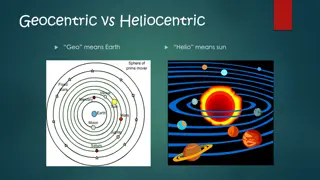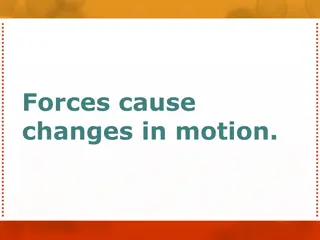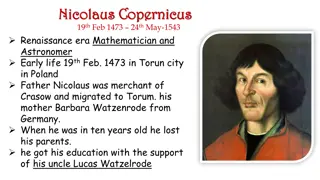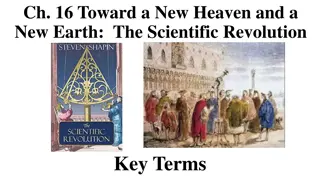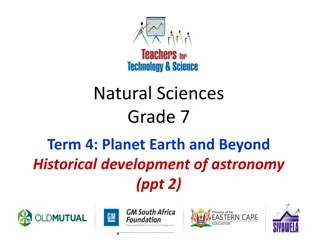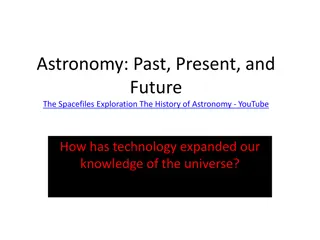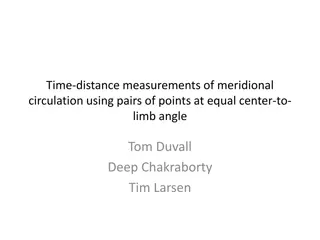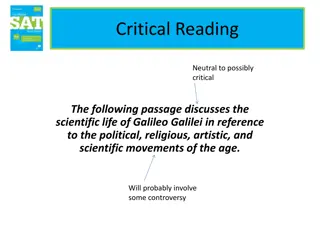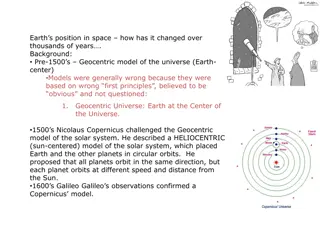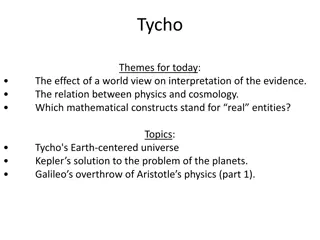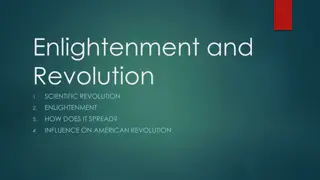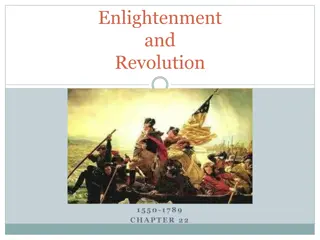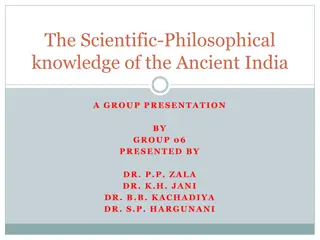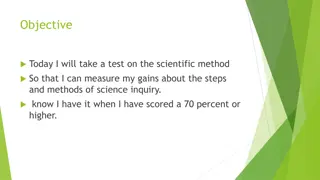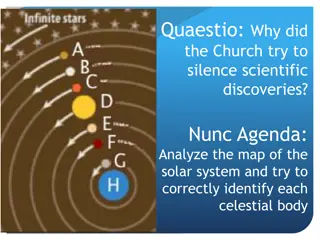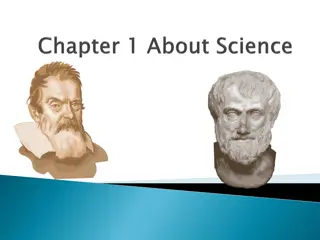Evolution of Cosmic Understanding: From Flat Earth to Heliocentrism
Over millennia, human perception of the universe has transformed from viewing the sky as a dome above a flat Earth to accepting the heliocentric model proposed by Copernicus. Ancient beliefs, such as the Hebrew view of the universe, gave way to Greek philosophers' spherical Earth theory and the even
7 views • 67 slides
The Revolution of the Solar System: Geocentric vs Heliocentric Theories
The geocentric theory placed Earth at the center of the universe, with all planets revolving around it, while the heliocentric theory proposed the Sun as the central body. Influential figures like Aristotle, Ptolemy, and Copernicus greatly impacted the understanding of our solar system, leading to p
1 views • 12 slides
Understanding Forces in Motion Throughout History
Forces play a crucial role in causing changes in motion, as observed through the perspectives of Aristotle on natural and violent motion, the beliefs about Earth's rest, and Copernicus challenging the geocentric view with a heliocentric model. The concept of forces driving motion has evolved over ce
1 views • 27 slides
Nicolaus Copernicus: Renaissance Astronomer and Mathematician
Nicolaus Copernicus, born on 19th Feb 1473 in Torun, Poland, was a key figure in the Renaissance era. He proposed the revolutionary Heliocentric Theory and argued that the planets revolved around the Sun. His major work, "On the Revolutions of Heavenly Spheres," challenged the geocentric view of the
0 views • 23 slides
Explore the Scientific Revolution
The Scientific Revolution marked a shift from the medieval worldview to a secular, rational, and materialistic perspective. Key terms such as geocentric and heliocentric conceptions, Cartesian dualism, rationalism, and the scientific method played pivotal roles in shaping this transformative period.
7 views • 10 slides
Historical Development of Astronomy in Grade 7 Natural Sciences
Explore the historical development of astronomy with renowned figures like Nicolaus Copernicus, Galileo Galilei, and Johannes Kepler. Discover key advancements in our understanding of the solar system and beyond, including the heliocentric model, telescopic observations, and planetary movement laws.
0 views • 10 slides
Evolution of Astronomy: From Ancient Civilizations to Modern Discoveries
Explore the history of astronomy from ancient Egyptian beliefs in Ra to the groundbreaking theories of Copernicus and Galileo. Witness how technology has revolutionized our understanding of the universe, leading to discoveries such as the heliocentric model and Kepler's laws of planetary motion.
0 views • 25 slides
Measurement Technique for Meridional Circulation in Solar Activity
In this research, time-distance measurements were conducted to study meridional circulation in solar activity. The east-west signal was found to be similar to the north-south signal, prompting analysis steps involving spherical harmonics computation, image reconstruction, filtering, cross-correlatio
0 views • 7 slides
Galileo Galilei and the Clash of Worldviews in the Renaissance Era
Galileo Galilei, born in 1564, navigated the turbulent waters of a Europe divided by cultural, religious, and political upheavals. The backdrop of the Counter-Reformation and the clash between geocentric and heliocentric astronomical theories shaped Galileo's scientific endeavors, challenging establ
0 views • 14 slides
Evolution of Earth's Position in Space Over Millennia
Before the 1500s, the geocentric model placed Earth at the center of the universe, which was later challenged by Copernicus with a heliocentric model. Kepler's laws further refined our understanding, particularly the first law focusing on planetary motion in elliptical orbits. This experiment demons
0 views • 19 slides
The Evolution of Cosmological Models: Tycho vs. Copernicus
Explore the historical debate between Tycho Brahe's Earth-centered universe and Copernicus's heliocentric model, focusing on the impact of worldviews on interpreting evidence, the relationship between physics and cosmology, and the role of mathematical constructs in representing real entities. Disco
0 views • 19 slides
Enlightenment and Scientific Revolution: Impact and Spread
The Renaissance and Reformation planted seeds for the Scientific Revolution by fostering curiosity and challenging traditional beliefs. The shift from the geocentric to heliocentric theory revolutionized understanding of the universe. The Scientific Method emerged, leading to groundbreaking discover
0 views • 16 slides
Enlightenment and Revolution 1550-1789 Chapter 22 Overview
This chapter provides a comprehensive overview of the Enlightenment and Revolution era between 1550-1789. It covers key concepts including the Scientific Revolution, Enlightenment thinkers such as Galileo Galilei, Isaac Newton, John Locke, Voltaire, and more. The vocabulary section introduces terms
0 views • 32 slides
Ancient Indian Scientific and Philosophical Knowledge: A Remarkable Insight
Explore the profound scientific and philosophical insights of ancient India as presented by Group 06 with a focus on remarkable achievements like the velocity of light, the Big Bang theory, Vedic astronomy, and concepts such as the heliocentric solar system. Dive into ancient texts like the Rig-Veda
0 views • 22 slides
Science Inquiry Test and Activities Summary
Join the journey of a student taking a test on the scientific method, exploring experiments at a Science Fair, and deciphering the heliocentric model. Dive into learning objectives, bell work exercises, and engaging activities that enhance understanding of the scientific method. Witness the quest fo
0 views • 33 slides
Evolution of the Heliocentric Model: Science vs. Church
The Church historically backed the Geocentric Model, placing Earth at the center of the universe based on biblical interpretations. However, trailblazing astronomers like Copernicus, Brahe, and Kepler challenged this notion by proposing the Heliocentric Model with the Sun at the center. This shift l
0 views • 18 slides
Evolution of Scientific Thought and the Scientific Method
Explore the evolution of scientific theories and methodologies through the works of influential figures like Aristotle, Copernicus, Galileo Galilei, and Francis Bacon. From the geocentric beliefs of Aristotle to the heliocentric model proposed by Copernicus, witness the shift in paradigms and the em
0 views • 14 slides

